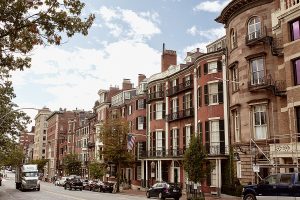Learning from life’s important places

The places where we live, work, or simply pass through on our life’s journey become part of who we are. Crucibles of growth and backdrops of memory, they are always with us, long after we have moved on to yet another place. The important places remain to instruct, entertain, and inspire confidence that, in a world of uncertainty and change, we learn on the way and arrive better prepared for whatever the next place holds in store.
The Boston area, my home since graduate school, has taught me well, and some of its early lessons come on the first day of my summer job. It is a cold, rainy day in late May and I am here for as an undergraduate research assistant in a residential school for children with what we now call special needs.
With only the subway map to guide me, I make my way from a stable at the race track where I am bunking with my uncle the jockey, across the sprawl of the city, to a complex of red brick buildings spread over a suburban hillside.
The Blue Line to Park Street, change there to the Green Line heading west, and transfer to an electric bus. The bus draws power from a metal contraption on the roof, fed by wires suspended over the road. We round a corner and the roof apparatus sparks and buzzes as it falls out of contact with the overhead wires.
The bus stops, but my heart starts to race, keeping time with my fantasies of the boss’s reaction to the new kid showing up late for his first day on the job. Then the driver gets out and prods the stubborn machinery back into alignment and we’re moving again. Where my map tells me I should get off the bus, I am still more than a mile from my destination, and so I walk in the rain over a bridge to the other side of the Charles River and up a very long hill. Everything is gray, cold, and wet.
The lab is warm and dry. The boss smiles and sympathizes with my travel woes. He introduces me to my co-workers who offer to help me get settled. As for the children who live here, they don’t seem to notice anything unusual about the arrival of another rain-soaked stranger.
Although I didn’t know it at the time, I was already learning valuable lessons. Don’t expect warm weather in Boston just because it’s May. You are more resourceful than you think. Bosses are more understanding than you fear. And life would be a lot easier if you used your resourcefulness to find a more convenient place to live and a better bus route.
The following year, I am back in Boston again, this time for graduate school, and over the course of the next four years, more clinical placements. Wherever I go, getting there is part of where I am, and the walk from my Cambridge apartment to the Red Line in Harvard Square teaches me to pay attention and savor the details of my surroundings.
Notice how the late spring trees with their pale green leaves shade the narrow side streets. Turn the corner onto Broadway, the wide thoroughfare that brings you straight to Harvard yard, passing the Broadway market, the public library, and the high school along the way. Pass through the iron gates of the college and into the quad where the morning sun, filtered through the trees, dapples the ground in front of the chapel.
The lessons of place continue as the Red Line carries me underground until it rises to cross the Charles where the dome of the state house shines in the morning sun on the opposite shore. Just as we arranged, my friend gets on at the next stop and we sit together and absorb the history of the city passing by outside the window.
Brahmin Beacon Hill, Irish Southie, Afro-American Roxbury all roll by, changing as we change from one train to another and then to the bus that drops us at a busy corner on the other side of the city. Nearby, at the state hospital, we will learn first-hand about serious mental illness from men and women who have been there too long and healed, if at all, too slowly.
There will be other hospitals and clinics in the city and in the suburbs, each with its own shape, size, and building materials, each with its own secrets to share. I will live in a series of apartments and finally a house where my wife and I will raise our family.
Every town, every neighborhood, every shelter that we call home will be a classroom for learning important life lessons. Gradually, everything changes. Neighbors come and go. Houses are knocked down and replaced, and even the city transforms into what used to be called a futuristic vision of itself. Then one day, you realize that the future you once imagined is already here.
Observing these changes, you cannot help but feel the chill of your own mortality in the face of the world’s impermanence. Fifty years after I first made my way across Boston to a summer job in a psychology lab, I am back in the city only blocks away from the hospital where I later interned.
Nothing looks the same. Then I notice the stonework on a coffee shop that was once a familiar corner drug store. A bus I used to ride rolls into view, and it all comes rushing back. I know then that it was never really gone, just buried somewhere deep inside, silently shaping the person I have become, still preparing me for the road ahead, and reminding me to enjoy the journey.
